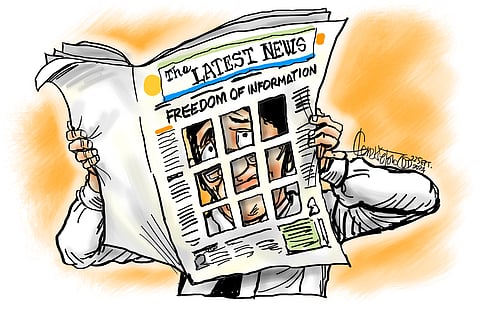
- NEWS
- the EDIT
- COMMENTARY
- BUSINESS
- LIFE
- SHOW
- ACTION
- GLOBAL GOALS
- SNAPS
- DYARYO TIRADA
- MORE

There will always be a world of difference between factual reporting or journalism and instant information gratification through social media, a contrast that highlights the value of mainstream media, particularly print.
During the 50th anniversary celebration of the Publishers Association of the Philippines Inc. (PAPI), President Ferdinand R. Marcos Jr. called on journalists to uphold integrity while seeking ways to report the truth with the advent of advanced technology.
The combination of the ubiquitous smartphones and the internet has resulted in an information revolution that initially was feared to cause the demise of traditional media, primarily newspapers, due to obsolescence.
The information age’s content providers were touted to replace journalists with age-old skills, particularly with the advent of artificial intelligence (AI) where writing is too good to be true while losing the human touch.
The increasing use of AI in social media and other information conduits through the World Wide Web will further diminish the credibility of quick information that lacks verification and, worse, is manipulated to favor partisan interests.
Mr. Marcos in his address said that journalism has become more relevant at this time and is now a “necessity for an informed and empowered citizenry to make the proper, intelligent, well-informed decisions about their leaders, about their situation, about their condition.”
“I urge you to keep pushing the boundaries of what it means to be a journalist. Innovate. Adapt. But never compromise your principles,” Mr. Marcos entreated the publishers.
He said that his administration shares the same aspirations as the media in fighting false information, considering that social media platforms have become “the new battleground” between fake and factual news.
The President was right in his assessment that “the relentless pressures of the digital age have added layers of complexity to ensuring press freedom.”
“Do not just fight. Lead the change. Verify, question, hold the line. We have a duty to protect the sanctity of facts, not just as citizens but as guardians of our shared reality,” Mr. Marcos said.
The threats journalists face to uphold objectivity in news writing are varied, from physical violence to having to suffer endless days in court fighting libel charges.
Mr. Marcos said his administration will be a partner of the media in exercising leadership and equipping the public, especially the youth, with skills to evaluate information and fight misinformation and disinformation.
News outfit DAILY TRIBUNE has bound itself to the commitment to uphold the truth across all its news platforms and has helped mold a generation of Filipinos who will not exchange facts for rumors that are flashed on social media.
While adhering to the strictest traditions of factual reportage, DAILY TRIBUNE has helped train a new generation of journalists determined to deliver credible news.
Mr. Marcos encouraged traditional media to remain steadfast.
“Let us continue to tell the stories that truly matter. Let us keep that light steady, no matter how fierce the storm,” he said.
In reply, Johnny Dayang, PAPI chair emeritus, indicated the need for the government to make sure that journalists can work in an environment free of threats and obstacles to their profession.
He expressed his hope for a reduced impact of cyber laws on press freedom, transparency and accountability from the executive branch, and compassionate and fair treatment of press freedom cases by the judiciary.
“In fine, my wish list is to see Congress pass a law decriminalizing libel and reducing the impact of cyber laws on a free press,” Dayang said.
“In the end, we must look to the reality that journalists, whether classified as reporter, editor or publisher, even if they are branded at times as creepy-crawlies, remain as the mouthpieces of democracy and its embodied liberties,” he said.
The abhorrence of the powers that be for the role of journalists in upholding free speech and stamping out excesses can be seen in the inability of Congress to pass the Freedom of Information Act which has been archived for more than three decades.
Decriminalizing libel and pressuring Congress to pass the FoI law will be Mr. Marcos’ legacy to the Philippine press — which is one of the most vibrant in the entire world.
